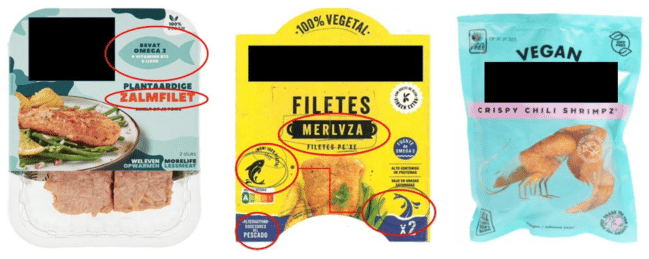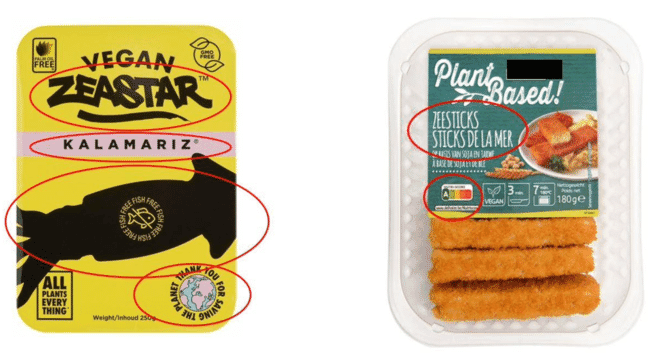
© MAC
The Market Advisory Council (MAC) has provided advice to the European Commission on the labelling of plant-based imitations of fisheries and aquaculture products. According to MAC, unclear messaging exists, including messaging that could be perceived as particularly detrimental to the image of the fishing sector.
Suggested recommendations
The MAC believes that the Commission should:
- Via the close cooperation of the services of DG Mare and DG Sante, reassess whether the existing legal framework sufficiently regulates the labelling and presentation of plant-based imitations;
- Assess the relevance of specific rules, including labelling and presentation, to regulate the sector of plant-based products, ensuring a level-playing-field in the EU market and accurate information to consumers that avoids any misleading;
- Guarantee the presence of fair competition in the EU market, including through inspection activities by the relevant authorities, to ensure that products present in the EU market respect fair information practices, in particular the provisions of Article 7 of the FIC Regulation;
- Take into account the recommendations provided under the advice on labelling of vegetarian and vegan fish imitations, adopted on 27 July 2021, and under the advice on substantiating green claims, adopted on 10 December 2020;
- Through the involvement of the services of DG Mare, DG Sante, and DG Agri, commission a study on the development of these products, including:
- Size of the market presence and growth potential
- Main ingredients and production methods to imitate the texture, sensorial properties, appearance, and flavour of fisheries and aquaculture products
- Labelling practices (eg choice of names similar to commercial designations of fisheries and aquaculture products, use of descriptions and pictorial representations usually associated with fisheries and aquaculture products, health and environmental claims)
- Dietary and health impacts of the replacement of fisheries and aquaculture proteins for plant-based proteins, particularly highly processed ones
- Consumer understanding and perception of plant-based imitation products, specifically of the labelling practices
- Take into account national developments on the labelling of foodstuffs, such as the Spanish Royal Decree 474/2014, 13 of June, which developed quality standards for meat products and restricted some designations to products made of meat, and the French Decree no 2022-947 of 29 June 2022 regarding the use of certain names to designate foodstuffs containing vegetable proteins.
Possible solutions
The MAC’s membership discussed different ways that adequate labelling of plant-based imitation seafood products could take place.
- Producers of plant-based imitation seafood products would not be allowed to use (part of) the seafood commercial designation on the package, unless the fish name is accompanied by the word “imitation”, in a similar structure to the labelling of defrosted unprocessed fisheries products (Article 35(1)(d) of the CMO Regulation).
- Producers of plant-based imitation seafood products would not be allowed to use (part of) the seafood commercial designation on package, but the use of the unprotected designation “fish” would be allowed. In line with the German guidelines, in order to provide a more detailed description of vegan and vegetarian products, when there is sufficient sensory similarity, plant-based producers would be allowed to use designations for cut pieces of fish and molluscs (e.g., “fillet”, “nugget”) and designations for categories of fish producers (e.g.,“smoked fish product”, “fried fish product”). The vegan or vegetarian character should be clearly indicated in a clearly visible and legible place by stating “vegan” or “vegetarian” or another clear indication.
- E.g.: “vegan/vegetarian/plant-based/etc” + “fish”
- Producers of plant-based imitation seafood products would not be allowed to use (part of) the seafood commercial designation on the package, but the use of the unprotected designation “fish” would be allowed. This should be accompanied by the word “imitation”, in a similar structure to the labelling of defrosted unprocessed fisheries products (Article 35(1)(d) of the CMO Regulation), meaning that the “imitation” reference should be retained in the same letter type and size as the “fish” designation.
- E.g.: “fish” + “imitation”
- Producers of plant-based imitation seafood products would not be allowed to use (part of) the seafood commercial designation on the package, unless that imitating product is clearly labelled on the front of the pack as “plant-based”, “vegan”, “vegetarian” or another clear indication, and, thus, conveying that it is actually a plant-based product and making sure that no consumer is misled. For this rule, a similar structure to the labelling of defrosted unprocessed fisheries products (Article 35(1)(d) of the CMO Regulation) could be used.
- E.g.: “vegan/vegetarian/plant-based/etc” + “(Part of) commercial designation”
- Producers of plant-based imitation seafood products would not be allowed to use (part) of the seafood commercial designation or make references to any seafood products, including the use of the unprotected designation “fish”.

© MAC
They also claim that in some cases, the commercial description and/or pictorial references suggest the presence of a particular food or ingredient that has been substituted with a different ingredient, including through morphological variations.
Suggested recommendations
In the context of the emerging market of plant-based imitations of fisheries and aquaculture products, the MAC believes that the commission should:
- Via the close cooperation of the services of dg mare and dg sante, reassess whether the existing legal framework sufficiently regulates the labelling and presentation of plant-based imitations;
- Assess the relevance of specific rules, including labelling and presentation, to regulate the sector of plant-based products, ensuring a level-playing-field in the EU market and accurate information to consumers that avoids any misleading;
- Guarantee the presence of fair competition in the EU market, including through inspection activities by the relevant authorities, to ensure that products present in the EU market respect fair information practices, in particular the provisions of Article 7 of the FIC Regulation;
- Take into account the recommendations provided under the advice on labelling of vegetarian and vegan fish imitations, adopted on 27 July 2021, and under the advice on substantiating green claims, adopted on 10 December 2020;
- Through the involvement of the services of dg mare, dg sante, and dg agri, commission a study on the development of these products, including:
- Size of the market presence and growth potential
- Main ingredients and production methods to imitate the texture, sensorial properties, appearance, and flavour of fisheries and aquaculture products
- Labelling practices (e.g., choice of names similar to commercial designations of fisheries and aquaculture products, use of descriptions and pictorial representations usually associated with fisheries and aquaculture products, health and environmental claims)
- Dietary and health impacts of the replacement of fisheries and aquaculture proteins for plant-based proteins, particularly highly processed ones
- Consumer understanding and perception of plant-based imitation products, specifically of the labelling practices
- Take into account national developments on the labelling of foodstuffs, such as the Spanish Royal Decree 474/2014, 13 of June, which developed quality standards for meat products and restricted some designations to products made of meat, and the French Decree no 2022-947 of 29 June 2022 regarding the use of certain names to designate foodstuffs containing vegetable proteins.
Possible solutions
The MAC’s membership discussed different ways that adequate labelling of plant-based imitation seafood products could take place.
- Producers of plant-based imitation seafood products would not be allowed to use (part of) the seafood commercial designation on the package, unless the fish name is accompanied by the word “imitation”, in a similar structure to the labelling of defrosted unprocessed fisheries products (Article 35(1)(d) of the CMO Regulation).
- Producers of plant-based imitation seafood products would not be allowed to use (part of) the seafood commercial designation on package, but the use of the unprotected designation “fish” would be allowed. In line with the German guidelines, in order to provide a more detailed description of vegan and vegetarian products, when there is sufficient sensory similarity, plant-based producers would be allowed to use designations for cut pieces of fish and molluscs (e.g., “fillet”, “nugget”) and designations for categories of fish producers (e.g.,“smoked fish product”, “fried fish product”). The vegan or vegetarian character should be clearly indicated in a clearly visible and legible place by stating “vegan” or “vegetarian” or another clear indication.
- E.g.: “vegan/vegetarian/plant-based/etc” + “fish”
- Producers of plant-based imitation seafood products would not be allowed to use (part of) the seafood commercial designation on the package, but the use of the unprotected designation “fish” would be allowed. This should be accompanied by the word “imitation”, in a similar structure to the labelling of defrosted unprocessed fisheries products (Article 35(1)(d) of the CMO Regulation), meaning that the “imitation” reference should be retained in the same letter type and size as the “fish” designation.
- E.g.: “fish” + “imitation”
- Producers of plant-based imitation seafood products would not be allowed to use (part of) the seafood commercial designation on the package, unless that imitating product is clearly labelled on the front of the pack as “plant-based”, “vegan”, “vegetarian” or another clear indication, and, thus, conveying that it is actually a plant-based product and making sure that no consumer is misled. For this rule, a similar structure to the labelling of defrosted unprocessed fisheries products (Article 35(1)(d) of the CMO Regulation) could be used.
- E.g.: “vegan/vegetarian/plant-based/etc” + “(Part of) commercial designation”
- Producers of plant-based imitation seafood products would not be allowed to use (part) of the seafood commercial designation or make references to any seafood products, including the use of the unprotected designation “fish”.




